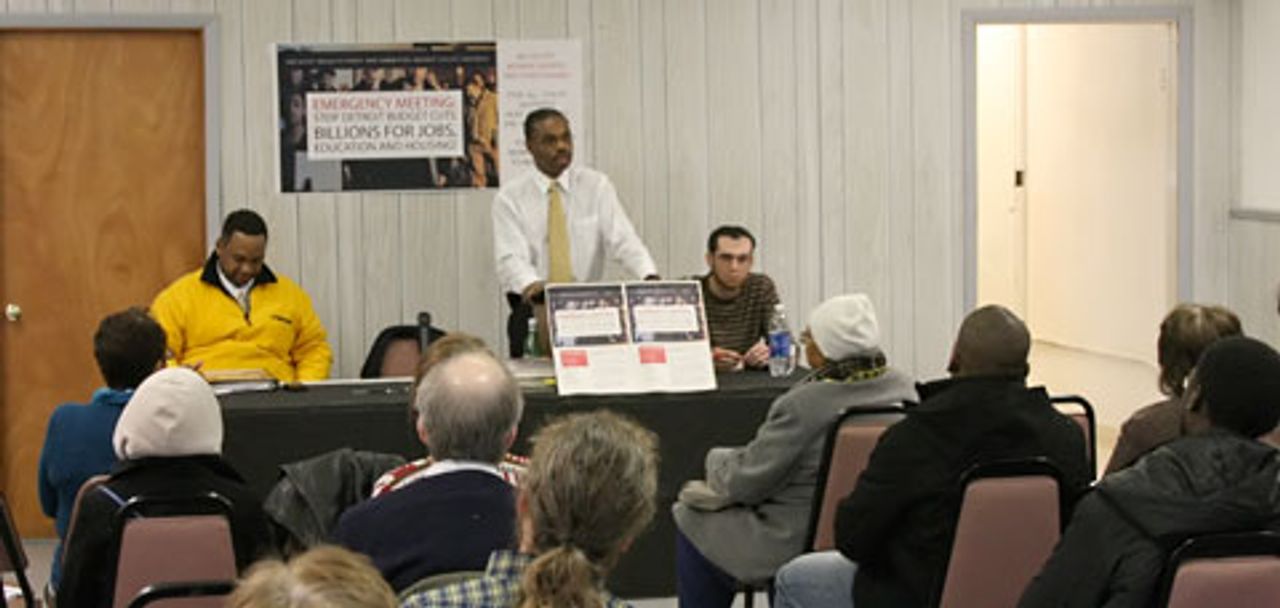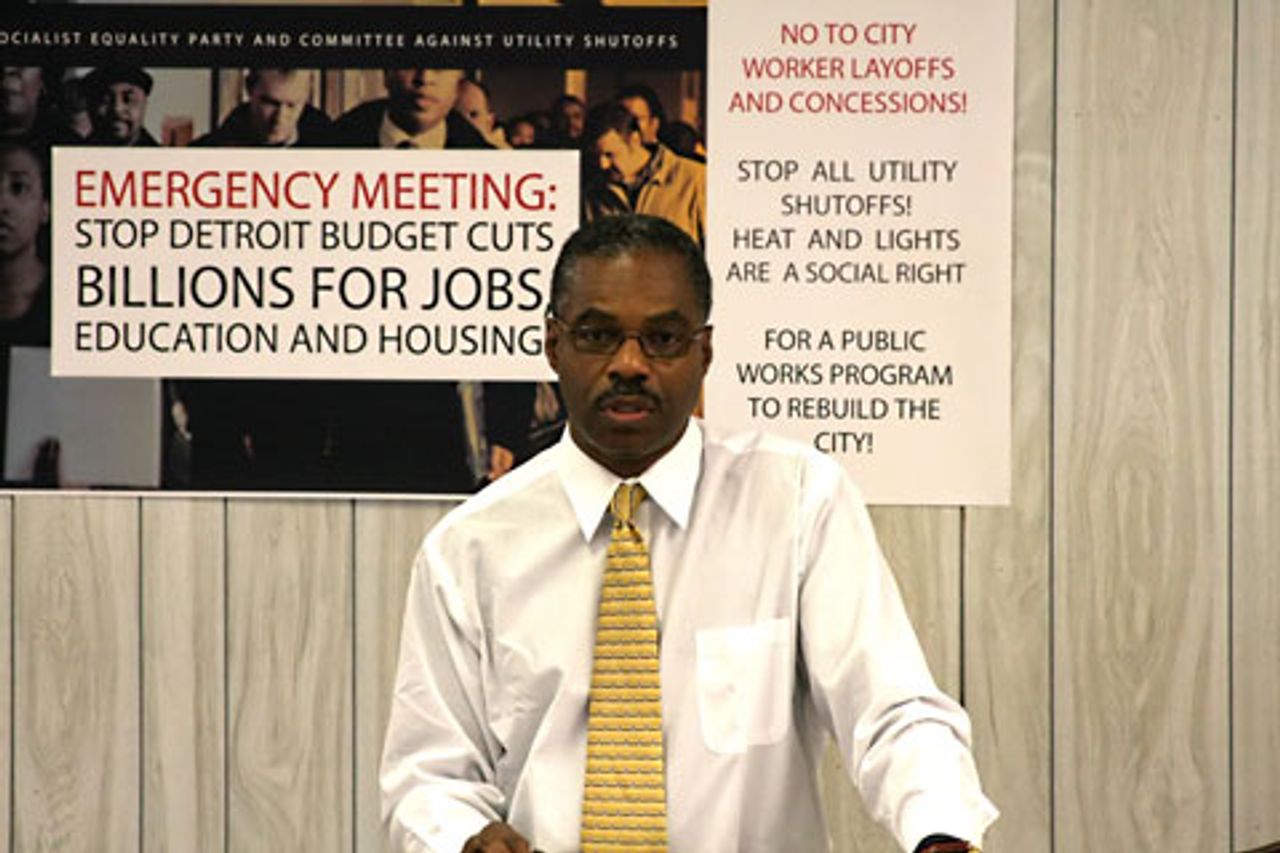 The platform of the Detroit meeting
The platform of the Detroit meetingThe Socialist Equality Party and the Committee Against Utility Shutoffs held a public meeting December 17 in Detroit to begin the political fight back against the attack on the working class, in the Detroit area and throughout Michigan.
Attending the meeting were city workers, teachers and students from Detroit and suburban areas, as well as members of the Committee Against Utility Shutoffs. Chairing the meeting was D’Artaganan Collier, a member of the Socialist Equality Party and a Detroit city worker.
Lawrence Porter, Chairman of the Committee Against Utility Shutoffs and Assistant National Secretary of the Socialist Equality Party, gave the main report. He outlined the wide scope of the cuts being proposed by Detroit Mayor David Bing and the City Council, including the layoff of more than 1,000 city workers and pay cuts of 10 percent.
 Lawrence Porter
Lawrence PorterHe emphasized that the demands for more cuts come as the working class has already suffered the greatest decline in its living standards of any major metropolitan area in the United States. Detroit has a real unemployment rate of around 50 percent, and 47 percent of all children live in poverty.
Porter stressed, “The crisis we are confronting in Detroit is not a local or a racial matter as the mayor and city council have presented it. The assault on jobs and social services in Detroit has national and international implications. The Obama administration has used Detroit as a testing ground for its reactionary ‘school reforms’ and ‘urban reforms.’”
Porter reviewed the anti-democratic implications of a recently enacted law in Michigan that gives state-appointed emergency financial managers dictatorial powers, including the ability to void union contracts and unilaterally impose spending cuts. He stressed that the nominal opposition of Mayor Bing and the City Council to the appointment of an emergency manager was only tactical, and that all factions of the political establishment were united in their determination to force the working class to pay for the crisis.
“What is happening here is taking place through the world,” Porter added. “Countries such as Portugal, Italy, Ireland, Greece, and Spain have been forced by the banks to carry out massive cuts in social services. The European banks have appointed their own version of the ‘emergency financial manager’ in Greece and Italy–so-called ‘technocrats’–whose sole purpose is to enforce deeply unpopular cuts.”
He continued, “We reject the position that there is no money for social programs! We have called this meeting to begin the struggle to fight for a program to unify the working class against the cuts and to fight for basic social rights. It is necessary to counterpose to the dictates of the corporations and the rich, a program that represents the interests of the working class.”
He insisted, the rights of workers today could only be won through struggle, a struggle that would unite all sections of workers and young people–employed and unemployed, black, white and immigrant–in a common political struggle against the profit system.
In coming months, Porter said, the SEP would fight to develop and encourage opposition in different sections of the working class throughout the region. He urged all those in attendance to join the SEP and take up the fight for socialism.
Following Porter’s report that was a prolonged discussion of the issues it raised.
A student asked about the SEP and how it distinguished itself from other political tendencies, and how it would resist the pressures to adapt to the existing system. Porter insisted that a party must be judged on the basis of its program and history. “One of the most important issues facing the working class," he added, “is the fight to break politically from the Democratic Party, which all the supposed 'left' organizations support in one way or another.”
“We believe the real issue is the independent political mobilization of the working class,” Porter said, contrasting this to the promotion of identity politics by all sorts of political tendencies around the Democratic Party. “They say the issues we face today are women’s rights, or black rights or the environment. No one talks about the rights of the working class. No one fights on a program to mobilize the independent political strength of the working class They have given up on that struggle altogether. They have adapted themselves to the Democratic Party.”
This type of politics found expression in the support given to the Obama campaign, he added. “We said at the time that Obama was running that he represented the interests of the banks and millionaires. Of course, millions of workers voted for Obama looking for a change. What we have gotten is not just more of the same, things have gotten worse. The war continues in Afghanistan. More wars are being prepared. They are looking at China. We are in the beginning stages of one of the deepest economic crisis since the 1930s.
“We don’t believe the solution is through the existing trade unions either. All the so-called lefts are oriented to the AFL-CIO. What the unions have done is that each struggle that has broken out, they try to come in and smother it.”
A retired worker wanted to know the SEP's position on the proposals for urban gardens in Detroit on land left vacant by the closure of industry and the consequent social collapse of the city.
Helen Halyard, a long time leading member of the SEP, explained that the social crisis in Detroit required a political, not an individual solution.“The plutocracy has turned Detroit into a wasteland. What was once the greatest industrial city in the country is now the poorest big city in America. There must be a political solution. That means a break with the Democratic Party and a fight to place the auto industry and banks under public ownership so that everyone can have enough food and other necessities.”
Joseph Kishore, National Secretary of the SEP stressed the necessity and inevitability of the working class entering into struggle as a social force. “It has been decades since there have been major working class struggles. Following the collapse of the Soviet Union the conception developed that this was the 'end of history,' the end of the class struggle. This was promoted both on the 'right' and the 'left.'"
“The developments of the last several years have exploded the conception that capitalism is everywhere triumphant. Workers are going to start to fight, and they are going to confront the fact that the fight for their rights brings them into conflict with a whole social economic system, with capitalism.”
A worker at a nonprofit agency described the pressures her organization is facing as a result of the budget cuts at the federal and state level. “We get 200 phone calls a month. We had a three-year program under Obama where we could help people facing eviction or who were homeless. Now that money is gone. We have no money to offer people. We know there are problems, but we have no solutions. In January, they start with all the utility shutoffs and again we have no money to help with utilities. There is really no place for people to go.”
Steve, a teacher in the Detroit suburbs, spoke to the WSWS after the meeting. He said, “I am concerned about educating the masses. It was nice to be at this meeting to hear those questions answered in an open forum.
“I think we all have to work together. We have in Detroit our own version of identity politics that not only pits different races against each other, but pits city versus suburb. It is nice to be at a meeting where people seem to understand that the identity politics of geography in Detroit is pulling people apart. Whether people live north of Eight Mile or south of Eight Mile we all need to work together. We are all working class people. We all have a similar stake in seeing the system totally changed.”
